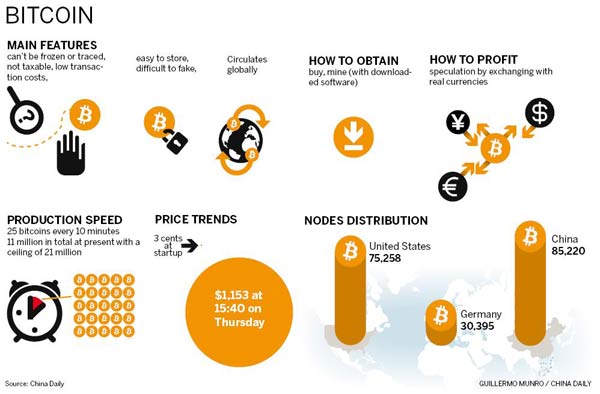


China's central bank barred financial institutions from handling Bitcoin transactions after investors lost money on fraudulent online platforms for the virtual currency.
The move also follows an 89-fold jump in the virtual currency's value this year, supported in part by demand from Chinese investors.
"Judging from its nature, Bitcoin is a specific virtual commodity. It does not have the same legal status as a currency and can't, and should not, circulate in the market," the People's Bank of China said in a statement posted on Thursday on its website.
The central bank published the statement jointly with the China Securities Regulatory Commission, the China Banking Regulatory Commission, the China Insurance Regulatory Commission and the Ministry of Industry and Information Technology.
The virtual currency does not bring systemic risks to China's financial system at the current stage, said the central bank, as the number of Bitcoins in circulation and the market scale are both limited.
No financial institutions of any kind should have a direct involvement in Bitcoin deals, it said. Financial institutions are banned from, among other things, trading, settling and market-making deals using Bitcoins, it added.
Websites that provide Bitcoin-related services will be asked to register with the country's telecommunication authorities.
The central bank said that the virtual currency could be used for reckless speculation, money laundering, drug and gun transactions, gambling and other illegal activities. It could also be used by terrorists to fund attacks, it added.
Investors and holders of Bitcoins in China said that the move may limit demand for the virtual currency in the country, but regulating the coin also means that authorities recognize its impact on financial markets.
"The ban on Bitcoin transactions for financial institutions may make some investors think that the virtual currency will not have the liquidity they expected, and they may withdraw from the market," said Chen Xiao, a Shanghai-based holder of the currency. "But on the other hand, regulators haven't banned the use and trading of the coin on Internet platforms, so that means that the currency was not labeled as illegal."
The Bitcoin was being traded at 5,920.87 yuan ($970) per coin on BTC China, the largest Bitcoin exchange in the country, at 6 pm on Thursday. On Sunday, the price on BTC China hit 7,395 yuan, an all-time high.
BTC China's CEO Bobby Lee was quoted by Bloomberg News on Thursday as saying that the regulators' move will protect the interests of consumers.
Lee added that BTC China is seeking recognition from the authorities for the currency so that it can be used to pay for goods and services instead of being used solely for speculation, the Bloomberg report said.
"Bitcoin trading can be considered a high-risk activity. Bitcoin prices are volatile, and can swing wildly, from day to day. Please use extreme caution when making the decision to invest in, or to sell, Bitcoin. BTC China is not asking users to buy or sell Bitcoin as an investment or for profit. All Bitcoin trading decisions should be made independently by the user," says the risk disclaimer on BTC China's website.
Fraudulent trading platforms have been raising concerns among Bitcoin investors in China.
"Trading Bitcoin on online platforms may not be as transparent as wiring money online — you don't see the money arriving in your bank account soon after the transaction; sometimes, it may take days to see where your money went," said Qian Zheng, a former Bitcoin trader.
"I won't trade Bitcoin again until there's a platform that gets legal recognition from regulators," Qian added.
Chinese police have detained three people who allegedly operated a fraudulent online Bitcoin trading platform, shut it down unexpectedly and then vanished with the investors' assets, the Xinhua News Agency reported yesterday.
Police said the trading volume of the platform, which claimed to be based in Hong Kong, grew gradually and it eventually ranked fourth in the country.
By the end of September, the platform had attracted 4,493 registered users who traded Bitcoin as if they were buying and selling stocks or futures, the police said.
The platform closed suddenly on Oct 26 and its management team could not be contacted after that, Dongyang police in Zhejiang province said.
An investor surnamed Qiao lost 90,000 yuan and reported the case to the Dongyang police department, which immediately started an investigation.
According to a report in Hong Kong-based newspaper The Standard, investors might have lost up to 25 million yuan.
Contact the writers at [email protected] and [email protected]
 Model with modified Audi A5
Model with modified Audi A5
 Model with German luxury cars
Model with German luxury cars
 Getting in the mood
Getting in the mood
 Models at Mercedes pavilion at 2013 Auto Guangzhou
Models at Mercedes pavilion at 2013 Auto Guangzhou
 Buick Riviera concept car at 2013 Auto Guangzhou
Buick Riviera concept car at 2013 Auto Guangzhou
 FAW-VW all-new Golf at Guangzhou auto show
FAW-VW all-new Golf at Guangzhou auto show
 VW donates more than 5k child safety seats
VW donates more than 5k child safety seats
 Honda models at 2013 Guangzhou auto show
Honda models at 2013 Guangzhou auto show